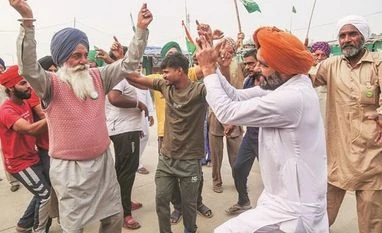At the Ghazipur border, the epicentre of the farmers’ protests, smiles have replaced angry faces and there are jalebis instead of banners in the hands of the people gathered there. It’s sweet victory for the farmers — and it has come after more than a year of agitation against the three controversial farm laws.
“Jalebi batt rahi hai; aaj Gurpurab hai,” says a beaming 63-year-old Gurpal Singh. “They (the central government) called us Khalistani, Pakistani, and Afghanistani, but today, by agreeing to repeal these draconian farm laws, the Prime Minister Narendra Modi has accepted that the laws which he used to call ‘white as milk’ were indeed black,” says Singh.
But for many of the protesting farmers, the Prime Minister’s announcement that the laws will be repealed is simply not enough. “The proof of the pudding is in the eating. We won’t vacate Ghazipur border until both Houses of Parliament repeal these three diktats,” says Sushil Singh, a 45-year-old farmer, who has been sitting at the protest site since January this year.
The Ghazipur border became the centre of the farmers’ agitation when, facing a crackdown by the government, Bharatiya Kisan Union leader Rakesh Tikait declared tearfully that he was ready to “face bullets or kill himself”.
However, though the farmers are elated that the government has finally bowed to their demand and rolled back the three contentious laws, they also exhibit an element of cautiousness and mistrust. Suleman Khan, a 49-year-old farmer from Amroha district in western Uttar Pradesh, says: “It is a welcome move. But we want action, not just words.”
Recalling Modi’s “promise” of giving Rs 15 lakh to every person if he came to power, a 99-year-old Raj Singh Chaudhary says, “Hamein bharosa nahin hai (we don’t have faith). Where is my 15 lakh? This government and the PM are known for lying to the people. How can we believe them?” he asks.
The farmers are also apprehensive about the timeline of the rollback. Some say it is just an
election gimmick in the run-up to the assembly polls in the agri-hubs of Punjab and Uttar Pradesh next year. Others point out that the PM has only fulfilled one demand.
“Only one demand has been accepted,” they say. “This is not just about these laws. It is a battle for our right to a minimum support price (MSP), among other things. The fight will continue until the government agrees to fulfil all of our demands.”
It is not just farmers who are happy after the PM’s announcement, which will, presumably, end the year-long agitation that left more than 600 people dead. Local commuters and residents, too, are overjoyed at the prospect of the protests finally coming to an end. “At last the nightmare of travelling 40 km extra to reach our office will be over. But whether they (farmers) go back or not is a big question,” says Srikant Sharma, a resident of Indirapuram (Ghaziabad).
Meanwhile, BKU leader Tikait said that the protests will not die down just yet. “The agitation will not be withdrawn immediately — we will wait for the day when the agricultural laws are repealed in Parliament. Along with the MSP, the government should also discuss other issues of farmers,” he tweeted.
Samyukta Kisan Morcha, the other party which has been at the forefront of the protests, is of the same view, and said that it would “wait for the announcement to take effect through due parliamentary procedures”.
In Ghazipur today, the farmers are celebrating, but ask them if they will listen to the PM’s request and go back home, and they declare: “Jab tak bill wapsi nahin tab tak ghar wapsi nahin (We aren’t going home until the laws are repealed).”
Unlock 30+ premium stories daily hand-picked by our editors, across devices on browser and app.
Pick your 5 favourite companies, get a daily email with all news updates on them.
Full access to our intuitive epaper - clip, save, share articles from any device; newspaper archives from 2006.
Preferential invites to Business Standard events.
Curated newsletters on markets, personal finance, policy & politics, start-ups, technology, and more.




)